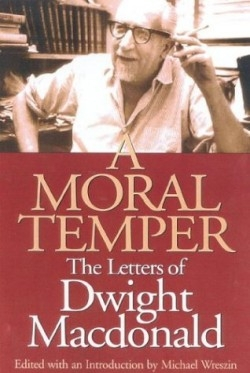A Moral Temper
The Letters of Dwight Macdonald
“How do you know I am a ‘good American?’” Macdonald demands of a British editor who has thusly praised him. Hardly the reaction one would expect, but perfectly in character for this journalist, editor, and critic, who took every word seriously and allowed neither praise nor friendship to soften his brutally candid assessments of politics, the arts and society. Rather than a good American, he considered himself a “critical American”—one of his few statements with which friend and foe alike would agree.
Beginning in the thirties and continuing for a half-century, Macdonald penned a voluminous body of articles, essays, and books while holding editorial positions with Fortune, Partisan Review, and Politics and working as a staff writer for Esquire and The New Yorker. Meanwhile, he corresponded regularly with family, friends, colleagues, and even illicit lovers, dutifully making copies of most letters, apparently anticipating their value to historians. Editor Wreszin, professor emeritus at Queens College and the City University of New York, who published a Macdonald biography in 1994, has assembled a fascinating collection of his letters. They offer insight into the life and thought of a towering figure in twentieth-century liberalism.
Educated at Yale, where his papers are housed, Macdonald soured on capitalism during his sojourn at Fortune. He became a fellow traveler, yet never joined the Communist Party, and ultimately rejected its “religious approach to Marxist doctrine” and refusal to disavow the murderous Stalin. Disillusioned with politics during the Eisenhower years, he turned his attention to popular culture, ridiculing its shallowness and commercialization. Macdonald’s political fire was rekindled during the sixties, as he supported peace and civil rights activists while criticizing their excesses—particularly the multiculturalist repudiation of the Western literary canon, which he defended until his death in 1982.
Students of the progressive movement will find these letters an indispensable resource, while more casual readers will be struck by the sheer breadth of Macdonald’s circle of acquaintances—from Trotsky to T.S. Eliot—and his lively, no-holds-barred writing style. “Why you damned whippersnapper, you impertinent pipsqueak, what the hell should I apologize for,” he thunders in 1958 to William F. Buckley Jr., with whom he enjoyed mostly friendly relations despite their political differences. “I gave your magazine hell, and it deserved it.” Macdonald gave many people hell, usually without apology. Yet, if only because his missives were so wonderfully readable, one assumes all was forgiven.
Reviewed by
John Flesher
Disclosure: This article is not an endorsement, but a review. The publisher of this book provided free copies of the book to have their book reviewed by a professional reviewer. No fee was paid by the publisher for this review. Foreword Reviews only recommends books that we love. Foreword Magazine, Inc. is disclosing this in accordance with the Federal Trade Commission’s 16 CFR, Part 255.

